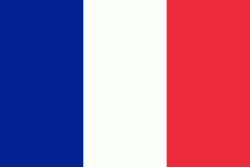Nord (North)
 |
Nord is the country's most populous department. It had a population of 2,608,346 in 2019. It also contains the metropolitan region of Lille (the main city and the prefecture of the department), the fourth-largest urban area in France after Paris, Lyon and Marseille. The department is the part of France where the French Flemish dialect of Dutch has historically been spoken as a native language. Similarly, the distinct French Picard dialect Ch'ti is spoken there.
Tribes of the Belgae, such as the Menapii and Nervii were the first peoples recorded in the area later known as Nord.
During the 4th and 5th Centuries, Roman rulers of Gallia Belgica secured the route from the major port of Bononia (Boulogne) to Colonia (Cologne), by co-opting Germanic peoples north-east of this corridor, such as the Tungri. In effect, the area known later as Nord became an isogloss (linguistic border) between the Germanic and Romance languages. Saxon colonisation of the region from the 5th to the 8th centuries likely shifted the isogloss further south so that, by the 9th century, most people immediately north of Lille spoke a dialect of Old Dutch. This has remained evident in the place names of the region. After the County of Flanders became part of France in the 9th century, the isogloss moved north and east.
During the 14th century, much of the area came under the control of the Duchy of Burgundy and in subsequent centuries was therefore part of the Habsburg Netherlands (from 1482) and the Spanish Netherlands (1581).
Areas that later constituted Nord were ceded to France by treaties in 1659, 1668, and 1678, becoming the Counties of Flanders and Hainaut, and part of the Bishopric of Cambrai.
On 4 March 1790, during the French Revolution, Nord became one of the original 83 departments created to replace the counties.
Modern government policies making French the only official language have led to a decline in use of the Dutch West Flemish dialect. There are currently 20,000 speakers of a sub-dialect of West Flemish in the arrondissement of Dunkirk and it appears likely that this particular sub-dialect will be extinct within decades.
Map - Nord (North)
Map
Country - France
 |
 |
| Flag of France | |
Inhabited since the Palaeolithic era, the territory of Metropolitan France was settled by Celtic tribes known as Gauls during the Iron Age. Rome annexed the area in 51 BC, leading to a distinct Gallo-Roman culture that laid the foundation of the French language. The Germanic Franks formed the Kingdom of Francia, which became the heartland of the Carolingian Empire. The Treaty of Verdun of 843 partitioned the empire, with West Francia becoming the Kingdom of France in 987. In the High Middle Ages, France was a powerful but highly decentralised feudal kingdom. Philip II successfully strengthened royal power and defeated his rivals to double the size of the crown lands; by the end of his reign, France had emerged as the most powerful state in Europe. From the mid-14th to the mid-15th century, France was plunged into a series of dynastic conflicts involving England, collectively known as the Hundred Years' War, and a distinct French identity emerged as a result. The French Renaissance saw art and culture flourish, conflict with the House of Habsburg, and the establishment of a global colonial empire, which by the 20th century would become the second-largest in the world. The second half of the 16th century was dominated by religious civil wars between Catholics and Huguenots that severely weakened the country. France again emerged as Europe's dominant power in the 17th century under Louis XIV following the Thirty Years' War. Inadequate economic policies, inequitable taxes and frequent wars (notably a defeat in the Seven Years' War and costly involvement in the American War of Independence) left the kingdom in a precarious economic situation by the end of the 18th century. This precipitated the French Revolution of 1789, which overthrew the Ancien Régime and produced the Declaration of the Rights of Man, which expresses the nation's ideals to this day.
Currency / Language
| ISO | Currency | Symbol | Significant figures |
|---|---|---|---|
| EUR | Euro | € | 2 |
| ISO | Language |
|---|---|
| EU | Basque language |
| BR | Breton language |
| CA | Catalan language |
| CO | Corsican language |
| FR | French language |
| OC | Occitan language |















